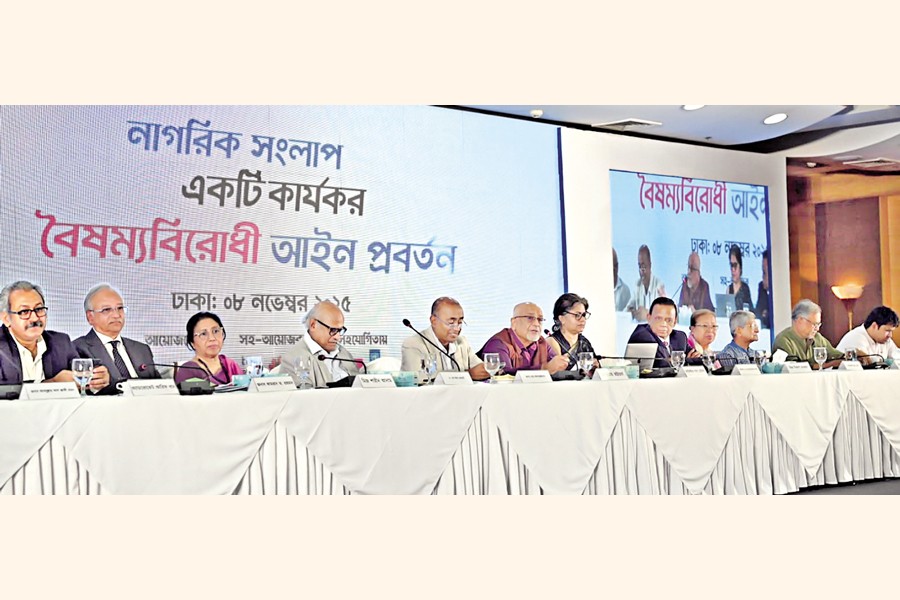
Published :
Updated :

Economist Dr Debapriya Bhattacharya has urged all political parties to include firm anti-discrimination commitments in their forthcoming election manifestos and called for the enactment of a comprehensive anti-discrimination law.
"Without legal protection, fair justice, free and credible elections, and meaningful reforms will remain unattainable. Political parties must pledge to eradicate discrimination in both legal and societal contexts through their manifestos," he said, addressing a civic dialogue on Saturday titled "Elimination of Discrimination in Bangladesh: Legal Context, Current Reality, and Way Forward."
The event was organised by the Citizen's Platform for SDGs, Bangladesh, in collaboration with the Bangladesh Legal Aid and Services Trust (BLAST), Manusher Jonno Foundation, and Nagorik Uddyog, with support from Switzerland and UNDP, in the capital.
Dr Debapriya, who chaired and moderated the session, said the need for a comprehensive anti-discrimination law has become urgent. "For the past few years, we have felt the necessity of a special law to tackle discrimination effectively. The previous government began work on a universally applicable law but lacked the political courage to implement it."
"This government, which has embraced the anti-discrimination spirit of the student movement, must act now -- the law is the demand of the hour."
He noted that the Citizen's Platform is working to eliminate discrimination in every form within legal and social structures, and that inclusion of anti-discrimination commitments in political manifestos would mark an important step toward long-term implementation.
Dr Debapriya stressed that three key areas -- justice, elections, and reform -- are directly dependent on protection from discrimination. "If we want fair justice, citizens must be safeguarded and their rights protected. You cannot demand justice while citizens remain unprotected," he said.
"Similarly, if we want free and inclusive elections, an anti-discrimination law is necessary to ensure equal participation. Reform, too, cannot be effective without universal rights."
He cautioned against selective advocacy, saying: "We cannot talk about anti-discrimination while picking and choosing which forms of discrimination to address. That universality must be restored."
Highlighting multiple vulnerabilities, Dr Debapriya cited examples where discrimination continues to impede development and rights. He mentioned that removing teachers deprives children of balanced and cultural development, while people with disabilities face restrictions on mobility and opportunity.
He also referred to women being denied the right to move and live according to their choices, small ethnic groups struggling for recognition of their identity, and regional disparities preventing large sections of the population from enjoying equal development benefits.
"If an elderly group cannot be protected, is that an anti-discrimination movement?" he asked.
Condemning violence against differing philosophical views, he said: "Inflicting physical harm to silence an individual's beliefs cannot be part of an anti-discrimination ethos."
Dr Debapriya also criticised the interim government for "pursuing reforms without engaging stakeholders," cautioning that meaningful transformation requires inclusivity and dialogue.
In her keynote paper, senior lawyer of the Supreme Court, Barrister Sara Hossain, urged political parties to commit to enacting an anti-discrimination law in parliament if elected. She also proposed forming a civil platform to monitor and ensure effective implementation of the law.
bdsmile@gmail.com


 For all latest news, follow The Financial Express Google News channel.
For all latest news, follow The Financial Express Google News channel.